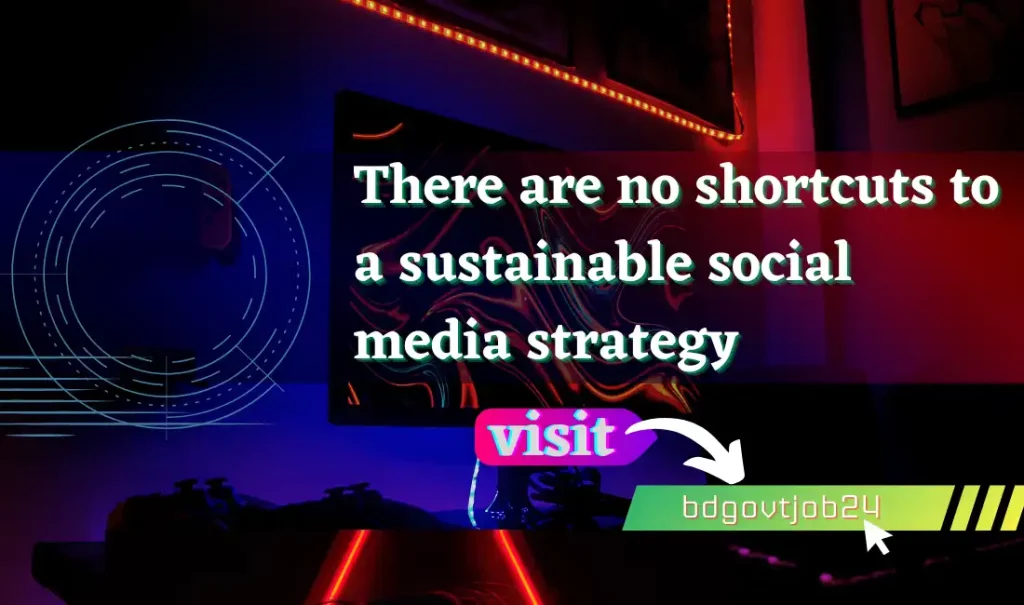As anyone who’s spent any time on social media knows, it can be a huge time sink. But if you want to use social media for business purposes, you can’t just treat it as a fun diversion. You need to have a strategy in place to ensure that your time investment pays off.
Social media has become a necessary part of doing business in the modern world. But with so many platforms and options, it can be hard to know where to start – or how to create a sustainable strategy that will last. In this article, we explore some of the key elements of a successful social media strategy and offer some advice on how to create one that will work for your business.
What is social media?
There’s no one-size-fits-all answer to this question, as the term “social media” can mean different things to different people. In general, though, social media refers to any online platform that allows users to interact with each other and share content. This can include everything from big names like Facebook and Twitter to smaller, niche platforms like Reddit and Tumblr.
When it comes to using social media for business purposes, there are a few key things to keep in mind. First, it’s important to have a clear understanding of your goals and objectives. What do you want to achieve by using social media? Once you know this, you can start to create content and strategies that will help you reach your target audience.
It’s also important to remember that social media is all about building relationships. This means that you need to be active and engaging with your followers if you want to see any results. Don’t be afraid to start conversations, ask questions, and share your own thoughts and experiences – this is what will make people remember you and come back for more.
What is a sustainable social media strategy?
There’s no one answer to this question since sustainability is relative. What works for one business might not work for another. That being said, there are some key components that all sustainable social media strategies share.
First and foremost, a sustainable social media strategy must be built on a foundation of quality content. This content must be interesting and engaging, and it must offer value to your audience. It’s also important to keep your content fresh so that your followers don’t get bored and move on to something else.
Another important element of a sustainable social media strategy is consistency. You need to be posting regularly, and you need to be responsive to comments and questions. If you’re not consistent, people will quickly lose interest in what you’re doing.
Finally, you need to have a plan for what you want to achieve with your social media strategy. Without goals, it’s impossible to measure success. By setting targets and working towards them, you can ensure that your social media strategy is sustainable in the long term.
Why are sustainable social media strategies important?
Sustainable social media strategies are important for a number of reasons. First, they help to ensure that your social media presence is long-lasting and not simply a flash in the pan. Second, they help you to avoid the pitfalls of many social media campaigns, which often involve spending a lot of money upfront with no guarantee of ROI.
Third, sustainable strategies help you to build an engaged community around your brand or product, which can be invaluable in the long term. Finally, sustainable strategies tend to be more effective overall, since they are based on solid principles and best practices rather than short-term thinking.
How to create a sustainable social media strategy
There are a lot of ways to create a social media strategy, but not all of them are sustainable. A sustainable social media strategy is one that you can keep up with over time, without burning yourself out.
Here are a few tips to create a sustainable social media strategy:
1. Be realistic about how much time you can dedicate to social media. If you only have a few minutes a day, that’s okay. Don’t try to do too much and end up feeling overwhelmed.
2. Automate some of your tasks. Use tools like IFTTT or Buffer to help you automate tasks like posting or scheduling content. This will free up some time so you can focus on other aspects of your strategy.
3. Create content that doesn’t require constant attention. Write blog posts, create infographics, and design images that you can share across your social channels. These pieces of content can be evergreen, meaning they don’t require constant updating.
4. Make use of social media listening tools. These tools will help you keep track of what people are saying about your brand online. You can use this information to adjust your strategy as needed.
5. Take breaks when you need them.
The benefits of a sustainable social media strategy

When it comes to social media, there are no shortcuts to success. A sustainable social media strategy requires time, effort, and dedication in order to create and maintain a strong presence online.
The benefits of a sustainable social media strategy are numerous. For businesses, a social media presence can help to build brand awareness, generate leads, and boost sales. For individuals, social media can be a great way to connect with friends and family, share information and experiences, and stay up-to-date on current events.
However, sustaining a successful social media strategy is not easy. It takes continuous work to create and post content, interact with followers, and grow your audience. But the rewards of a sustainable social media strategy are well worth the investment.
What are the benefits of a sustainable social media strategy?
There are many benefits to having a sustainable social media strategy. Perhaps the most obvious benefit is that it can help you avoid the pitfalls of a “quick fix” approach. A sustainable social media strategy takes the time to build relationships and create content that is truly valuable to your audience. As a result, your audience is more likely to stick with you in the long run.
In addition, a sustainable social media strategy can help you save time and money in the long run. By taking the time to create quality content and build strong relationships with your audience from the start, you won’t have to waste time and money chasing new fans and followers every time your numbers start to dip.
Finally, a sustainable social media strategy simply makes good business sense. In our fast-paced, constantly-connected world, social media has become one of the most powerful tools for building brand awareness and connecting with customers. If you want to get the most out of your social media efforts, you need to take a sustainable approach.
What are the challenges of implementing a sustainable social media strategy?
There are many challenges that come with trying to implement a sustainable social media strategy. For one, it can be difficult to come up with content that is both interesting and informative. It’s also a challenge to keep up with the latest news and trends in social media and to make sure that your content is relevant to your audience.
Additionally, it can be tough to get people to actually read your content, let alone share it or engage with it. And finally, you need to make sure that you’re constantly monitoring and evaluating your progress so that you can adjust your strategy as needed.
The challenges of a sustainable social media strategy
There are no shortcuts to a sustainable social media strategy. The challenges of managing a successful social media presence are many and varied and require a dedication of time, energy, and resources.
However, the rewards of a well-executed social media strategy can be significant, both in terms of reach and engagement. A sustainable social media strategy requires a clear understanding of the goals and objectives of the platform or platforms being used, as well as a realistic assessment of the resources that can be devoted to its upkeep.
It is also important to have a plan for how content will be created and maintained over time. This includes identifying who will be responsible for creating and curating content, as well as establishing processes for approving and publishing content.
Finally, regular monitoring and reporting on performance are essential to ensure that the social media strategy is achieving its desired results. By taking these steps, you can develop a sustainable social media strategy that will help you achieve your business goals.



